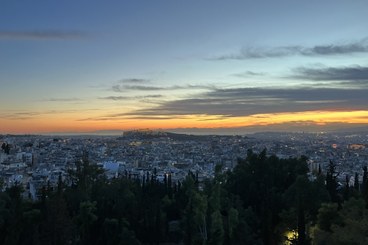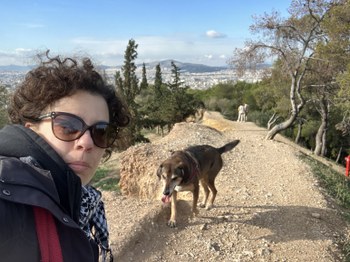
Greece entry-zones - The Route’s starting points
By Valeria Raimondi

From September to December, 2023 I conducted field research in Greece. This fieldwork aimed at understanding the changing situation of migrants in mainland Greece. More specifically, I sought to learn how recent and ongoing developments in national migration policies have influenced the geography of migrants' passage through the country, resulting in the opening of new routes to continue towards other European countries.
During my stay in Greece I was based in Athens, visiting other cities for short periods, including Ioannina, in the north-west of the country, and Patras. My research mainly consisted of interviews and ethnographic observation in key locations for the presence of migrants, including both formal camps and informal sites.
In Athens, I strategically visited several sites frequently, including Viktoria square, the Peidon tou Areos park, and the Exarcheia neighborhood. Furthermore, I went to visit the sites of the refugee camps of Eleonas and Ellinikò, now abandoned and demolished respectively. Viktoria Square is considered the “hub” of Afghan people (but not only) in the city, and in general one of the most relevant places for migrants in Athens. I made frequent day visits to cities and refugee camps in the Athens area, including Corinth, Thebes, Malakasa, Ritsona, and Schisto.
At the beginning of November I went to Patras where, with TheGame team member Emma Farina, we met a group of activists who have been part of the migrant solidarity movement in the city for about twenty years. The activists accompanied us on a visit to the Ladopoulos abandoned factory in front of the port of Patras. For years the site had been used as a refuge by migrants who hid there when trying to board ferries to reach Italy. The factories are currently empty, reflecting the government's attempt to govern the presence of migrants and their movements in and out of the country.
In mid-November I spent a week in Ioannina. Thanks to the NGOs Second Tree and Habibi Works, I had the opportunity to begin to know the reality of the city and to interview migrant people who live in Agia Eleni and Katsika, two refugee camps on the outskirts of the town. The central themes that emerged from the visit and the meetings revolve around the consequences of fencing the camps and related material changes, and the difficult and precarious labour of the people who are hosted inside the facilities.
Throughout the fieldwork period I conducted interviews with members of the Greek government institutions, as well as with representatives of NGOs and other associations that carry out activities with or in support of migrants, activists, local inhabitants, and journalists.
I also conducted interviews with migrant people who had recently arrived in Greece or who had resided in the country for several years. For those living in refugee camps, interview conversations focused primarily on the living conditions within government reception facilities, on the difficulties encountered in the process of requesting international protection, and on their expectations for the future and the possibilities for continuing travel to other European destinations. Interviews with migrant people in the city of Athens revealed growing difficulties in the urban space, due to their perception of strong hostility towards them. Interviewees also reported on the difficulty in finding adequate, safe, and stable housing and work.
I will explore the themes of the closure and "securing" of camps and the labor conditions of encamped migrants during further fieldwork from April to July 2024.